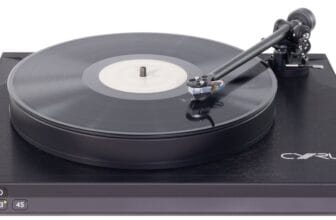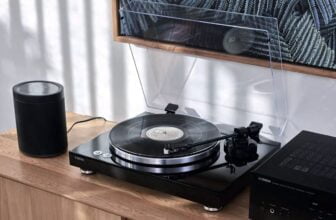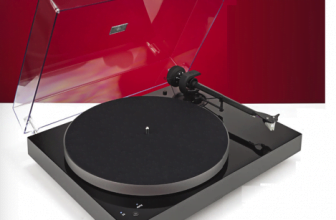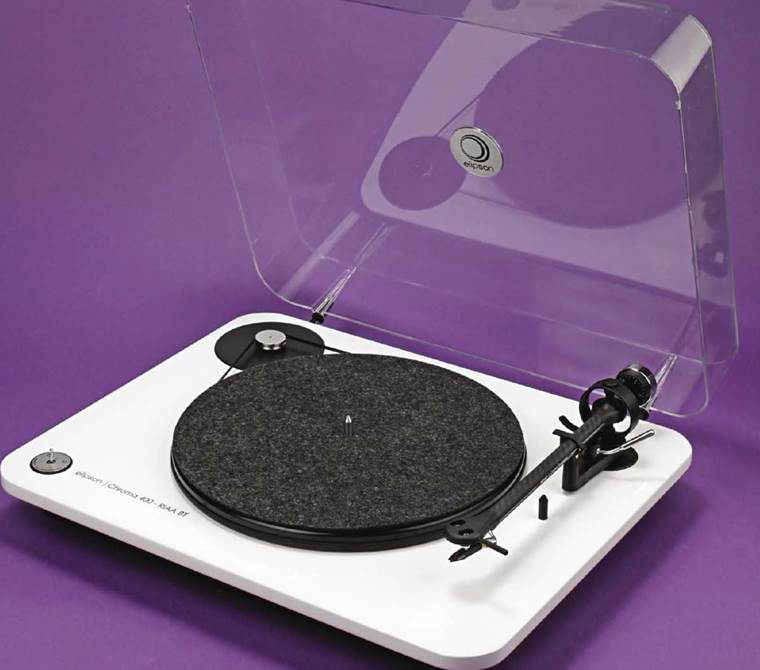MoFi StudioDeck+ Review – Mellow yellow
As he samples MoFi Electronics’ more affordable turntable package. Adam Smith checks out if it thrills like its bigger brother. Read our MoFi StudioDeck+ Review.
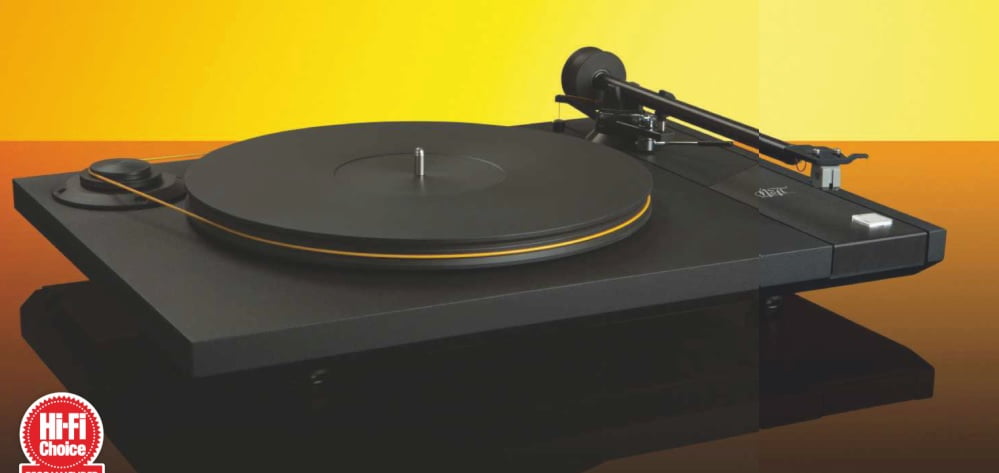
As the cheaper of the two turntables currently offered by Mobile Fidelity’s audio wing, MoFi, the StudioDeck comes supplied without a cartridge as standard. It also costs considerably less than its bigger brother, the UltraDeck (HFC 459). But before you start to question the value of reviewing an entry-level turntable, consider the Dual CS505-2, Technics SL-1200 and Pioneer PL-12D. All absolute classics, I’m sure you’ll agree and rightly recognised for being relatively lowly models in their manufacturers’ ranges at the time. Yes, a proper vinyl nut will most likely also know of the Dual CS 731Q, Technics SL-1350 or Pioneer PL-61 – which were the associated range-toppers – but the ‘cheapies’ have become more famous thanks to their superb sound-per-pound value.
In this respect, the StudioDeck is off to a highly promising start. Just like its bigger brother, its design comes from the pen of Spiral Groove’s Allen Perkins. In addition, the lower price tag has not removed the highly effective isolating feet, designed by Harmonic Resolution Systems.
The footprint of the plinth is also the same as the UltraDeck, although the material employed is slightly thinner and the internal construction simpler. On the StudioDeck, a single aluminium internal plate provides the constrained layer damping properties, and this supports tonearm, bearing and motor. The deck is fitted with an identical lid to the UltraDeck and also pivots on very basic plastic
DETAILS
PRODUCT MoFi StudioDeck+
ORIGIN USA
TYPE Belt-drive turntable
WEIGHT 8.7kg
DIMENSIONS (WxHxD) 500 x 137 x 362mm
FEATURES
• 33 &45rpm
• Supplied with MoFi StudioTracker MM cartridge
DISTRIBUTOR Karma AV
TELEPHONE 01423 358846
WEBSITE karma-av.co.uk
hinges that really don’t quite feel up to the job of supporting it effectively.
The platter and motor pulley are both Delrin. The platter weighs in at a fraction under 1.8kg and is 19mm thick, with a deep groove machined into the edge of it to keep the belt securely in place. The StudioDeck uses the same inverted bearing configuration as the UltraDeck, but based around steel, bronze and Teflon materials, which should ensure many years of silent rotation.
The StudioDeck’s arm is outwardly similar to that of the UltraDeck and has the same specifications. It measures 10in in effective length rather than the more usual 9in and pivots on high-quality ball bearings. Once again, rear phono sockets are fitted for the user to choose their own cables, but internal arm wiring is oxygen-free copper as opposed to Cardas. The arm is fully adjustable for height and cartridge azimuth and has a damping o-ring between armtube and headshell.
As part of the ‘+’ package, the StudioDeck is supplied with a pre-fitted StudioTracker cartridge, but is offered when bought together. This is a moving-magnet design of slightly lower mass than its UltraTracker and MasterTracker brethren – 6.4g compared with 9.7g. It utilises the same ‘V’ arrangement of magnets as the other models and sports an elliptical stylus, which is not user-replaceable.
MoFi has supplied a Super HeavyWeight clamp, which is machined from a solid billet of aluminium. As with the UltraDeck, it significantly improves the StudioDeck’s performance and so is employed throughout the review.
For auditioning, the StudioDeck+ is placed on an Atacama Equinox rack and connected to an Anatek MMC phono stage feeding my Naim Supernait amplifier and Mowgan Audio Ogma loudspeaker.
Sound quality
From the start, it is clear that the StudioDeck+ has the same appealing enthusiasm as its sibling, albeit with a slightly more laid-back nature. It has a wonderful sense of balance across the frequency range and doesn’t attempt to leap out and blind you with brilliance in one area, while falling behind in others.
The first thing that strikes me is its composed performance. Spin a poorly recorded track and it doesn’t hide from letting you know all is not perfect, but it also makes the most of the musical message within. The StudioTracker cartridge helps here, offering secure tracking and digging
It excels in terms of soundstaging and arranges instruments and singers expertly
deeply into the grooves to find the best bits. However, it’s when you play something that’s well recorded, that it simply steps aside to let the music through; the slightly lower tracking distortion offered by the longer arm assisting in making everything very pure, clean and detailed.
At the low end, the StudioDeck+ setup is beautifully extended and very well detailed, ensuring performances are anchored in a firm and stable foundation. Bass lines sit perfectly within the mix, neither becoming overbearing nor shrinking off into the background. The combo seems able to judge how much punch to offer and does exactly that, so that parts of Malia and Boris Blank’s Convergence have my floorboards vibrating in sympathy. Then again, snappier and punchier material skips along with a fleetness of foot that makes the deep thunder a distant memory.
Further up the bass spectrum, the deck is occasionally a little less sure of itself. There is a slight ‘chesty’ bloom at times, albeit one that is noticeably reduced by use of the clamp. Chris Rea’s vocals on Nothing To Fear are a little fruitier and more resonant than I would like. Combined with a slightly higher than normal level of surface noise, I wonder if the cartridge might be to blame so perform a quick swap for an Ortofon 2M Black (HFC 434). This makes everything taut and quiet once again and clarifies that an even better cartridge will release more magic from the turntable.
With the MoFi cartridge re-fitted, it is hard not to be impressed by the other aspects of its sound. It excels particularly in terms of soundstaging and arranges instruments and singers expertly. Re-visiting the Chris Rea track, I am struck by the way the subtle cymbal from the drum machine is not crowded out by the slide guitar work that leads it; I have heard it quietly sneak off to sulk in a corner on lesser-equipped rivals.
Conclusion
The StudioDeck+ is a well-matched turntable combination. The player itself is a breeze to set up and a pleasure to use and, while the bundled cartridge complements it well, it is also capable of showing the benefits of an upgrade. Ultimately, the UltraDeck pips it to the post in a couple of key areas, as it should do, but the price difference between the two seems bigger than you would expect. The StudioDeck+ is a great turntable package in its own right and so comes warmly recommended
IN SIGHT
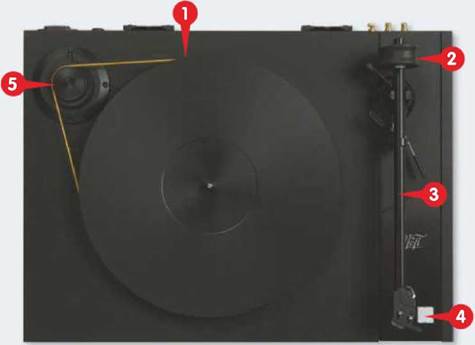
1 19mm-thick Delrin platter
2 Counterweight
3 10in MoFi Studio tonearm
4 StudioTracker MM cartridge
5 Motor and pulley for speed selection
OUR VERDICT
HOW IT COMPARES
Similar expenditure will buy you Clearaudio’s Concept MM setup with Concept V2 cartridge, a Rega Planar 6 (HFC 453) with Exact MM cartridge or the Pro-Ject The Classic Evo with Ortofon Quintet Red MC cartridge. Although Technics SL-1200GR (HFC 426) doesn’t have a cartridge, it remains an essential audition at this price.


